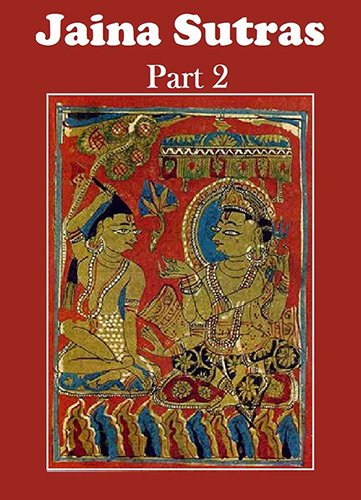Sutrakritanga (English translation)
by Hermann Jacobi | 1895 | 52,880 words | ISBN-10: 8120801466 | ISBN-13: 9788120801462
The English translation of the Sutrakritanga, which represents the second Agama of the 12 Angas in Shevatambara Jainism. It is traditionally dated to the 4th-century BCE and consists of two parts (verse and prose) explaining various doctrinal aspects of Jainism. Alternative titles: Sūtrakṛtāṅga (सूत्रकृताङ्ग), Sūtrakṛta-aṅga (सूत्रकृत-अङ्ग), Prakr...
Lecture 16, The Song
[Note: Gāhā = gāthā. In this lecture, which is in prose as regards form and contents, there is nothing that could justify the title given it.]
Now the Venerable One said: He who thus subdues his senses, who is well qualified (for his task)[1] and abandons his body, is to be called a Brāhmaṇa, a Śramaṇa, a Bhikṣu, a Nirgrantha. (The pupil) replied: Why is he who thus subdues his senses, who is well qualified (for his task) and abandons his body, to be called a Brāhmaṇa, a Śramaṇa, a Bhikṣu, a Nirgrantha? Tell this, O great sage! (1)
He is a Brāhmaṇa for this reason that he has ceased from all sinful actions, viz. love, hate, quarrel, calumny, backbiting, reviling of others, aversion to control, and love of pleasures, deceit, untruth, and the sin of wrong belief; that he possesses the Samitis, always exerts himself, is not angry, nor proud. (2)
He is a Śramaṇa for this reason that he is not hampered by any obstacles, that he is free from desires, (abstaining from) property, killing, telling lies, and sexual intercourse; (and from) wrath, pride, deceit, greed, love, and hate: thus giving up every passion that involves him in sin, (such as) killing of beings. (Such a man) deserves the name of a Śramaṇa, who subdues (moreover) his senses, is well qualified (for his task), and abandons his body. (3) He is a Bhikṣu for this reason that he is not conceited, but modest, and obedient (to his Guru), that he subdues his senses, is well qualified (for his task), and abandons his body, that he sustains all troubles and calamities, that he practises with a pure mind the (prescribed) conduct, exerts himself well, is steadfast, and eats but a moderate quantity[2] of food which is given him by others. (Such a man) deserves the name of a Bhikṣu. (4)
He is a Nirgrantha for this reason that he is single[3], knowing the absolute (ātman), awakened, proof against sins, well disciplined; that he possesses the Samitis and equanimity, knows the true nature of the Self, is wise, has renounced the causes of sin both (objectively and subjectively[4]), does not desire honour, respect, and hospitality, but searches and knows the Law, endeavours to gain Liberation, and lives restrained. (Such a man) deserves the name of a Nirgrantha, who subdues his senses, is well qualified (for his task), and abandons his body. (5)
Know this to be thus as I have told you, because I am the Saviour. (6)
Thus I say.
Footnotes and references:
[2]:
Saṃkhāya. The commentator takes this word as a gerund and explains it: knowing (the vanity of the world).
[3]:
Eka, i.e. free from love and hate.
[4]:
Dravyato bhāvataska.
